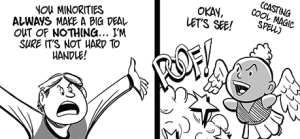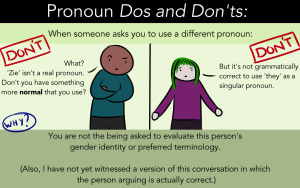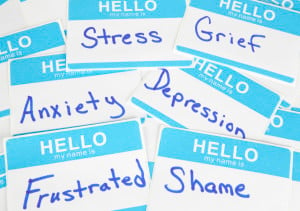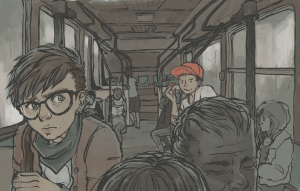In mid-June, catastrophic news circulated the internet rather quietly: The Dominican Republic is in the process of being “socially cleaned” – which, terrifyingly, sounds like “ethnic cleansing.”
Some prominent voices have spoken out, but many of us haven’t. The reasons why are incredibly troubling.
First, the news: The Constitutional Court in the Dominican Republic has stripped away the citizenship of several generations of Dominicans.
Meaning a quarter of a million people of Haitian descent – specifically, those born after 1929 to parents who are not of Dominican ancestry – will be rendered stateless and without civil rights.
Some of these people have had no personal connection with Haiti for several generations.
And this is happening because they are black – Afro Latinx. It is also because of their blackness – or rather, the prominence of anti-black racism – that this atrocity will not be discussed by US-based Latinx media.
All of this has led me to think a great deal about how complicit I have been in the erasure of Afro Latinxs in my own community and work.
And it’s reminded me of something I experienced last year.
A Latina journalist whose work I respect began engaging her non-black Latinx Facebook friends and Twitter followers on the topic of anti-blackness in Latinx communities, inviting folks to share stories about how deeply-seated anti-blackness was in their families and how they saw it being perpetuated.
I could not participate in these conversations.
I wanted to push back on what I thought was being implied: that non-black Latinxs are inherently anti-black.
The truth is, the source of my discomfort was the realization that anti-black racism is deeply ingrained in the Latinx community and discussing it honestly can feel a lot like throwing people we love – often, our own family members – under the bus.
Let me get personal to better explain what I mean.
I am biracial. My father is an immigrant from Mexico, and my mother was white with roots in Tennessee. In my home, anti-black racism came as easy as breathing.
On the surface, the brown side and white side of my family had nothing in common, but the one thing I saw family members routinely bond over was their dislike – and in some cases, downright hatred – of black people.
You can assume the worst anti-black racism came from the white side of my family, but you’d be wrong.
So much of their racism is based on an us-versus-them mentality, with my Latinx family members failing to hate the system that has us fighting for resources. Instead, they hate black people.
These are people I love, but their beliefs are wrong.
That doesn’t make discussing anti-black racism in our families and communities any easier, which is why reading the conversations initiated by the Latina journalist had my heart racing.
I have to keep questioning my own discomfort, where it stems from, and why it exists. In the process, I’ve learned some things about myself and about the way anti-blackness operates.
I’ve learned that if I read something that immediately makes me feel defensive, it’s striking a chord because it’s true and I don’t want it to be; it’s because it’s forcing me to question my privilege, which is a hard, uncomfortable process.
I’ve learned that being called anti-black is not the same as, and definitely not more painful or violent than, experiencing anti-blackness.
I’ve also learned that anti-blackness often thrives in Latinx communities in two specific ways: 1) by being ignored entirely, and 2) by masquerading as solidarity.
Silence Is Compliance, So Anti-Blackness Thrives by Being Ignored
For those of us non-black Latinxs who like to think of ourselves as incapable of anti-blackness, watching the travesty unfold in the Dominican Republic has left us feeling helpless.
But it is our deafening silence on the issue that should make us feel ashamed.
Where is the public outcry? Where is the mobilization? Where is the urgency we exhibit when non-black immigrants in the US are detained and deportation proceedings are on the horizon?
Our silence concerning the treatment of Haitians in the Dominican Republic says what is happening is okay, and it makes us complicit in the systemic oppression that black people face around the world – and this silence is deadly.
It is clear that we do not recognize this as an issue that impacts our community because we do not claim black Latinxs as community members and issues that impact them are not seen as our issues. We are actually more apt to deny them their blackness than acknowledge they exist.
But as Edwidge Danticat recently said, “This horror, whether we continue to watch it or not, will continue to go on.”
To be more specific, the “horror” is murder, displacement, genocide – and these are the things that inhabit our silence.
The sentiment being expressed in the Dominican Republic is the same sentiment non-black Latinxs express daily to Afro Latinxs in the States: We don’t want you.
Anti-Blackness Thrives When We Conflate It with Solidarity
Complying with the erasure of an entire segment of the Latinx population and remaining silent in the face of anti-blackness are more blatantly anti-black and therefore easier to spot.
What is more difficult to identify as anti-black are honest attempts at solidarity.
After Ferguson and Baltimore, in the wake of the ever-growing Black Lives Matter movement co-founded by Alicia Garza, Patrisse Cullors, and Opal Tometi, we have seen writing, art, and social engagement from non-black Latinxs wanting to convey their support.
We have also seen many well-intentioned attempts at drawing parallels between the brown and black experience in America.
While there is a way to talk about those similarities successfully, what often happens is that black people are erased from their own experiences and movements.
Garza, Cullors, and Tometi have asserted that Black Lives Matter is “rooted in the experiences of Black people in this country” who actively resist their de-humanization. It is also “a call to action and a response to the virulent anti-Black racism that permeates our society.”
There isn’t a gentle way to say this, so here goes: Every time non-black people of color write “Brown Lives Matter” or “Black and Brown Lives Matter,” we are diminishing the intent of the Black Lives Matter movement.
We are co-opting something that is not ours and that wasn’t meant for us.
And we are taking up space in a national conversation about anti-blackness that we don’t experience.
Seriously, how many of us haven’t rolled our eyes at a white person asserting online or otherwise that “all lives matter?”
As non-black Latinxs, we can easily recognize when it is white people who are co-opting, when it is white people who are taking up space in conversations that don’t impact them, but as people of color, it’s more difficult to identify when we do these things.
When we take from the Black Lives Matter movement, diminishing its message and asserting that “Brown Lives Matter,” we’re basically doing the same thing as saying all lives matter.
Surely, for many non-black Latinxs, this is not a comfortable thing to be told.
But it’s important to remember that when black people say their lives matter, it doesn’t mean that ours don’t. When police brutality, white supremacy, racism, and criminalization are discussed in the context of anti-blackness, it doesn’t mean that Latinxs and other people of color do not experience police brutality, suffer at the hands of white supremacy, or experience racism and criminalization.
Non-black Lanixs and other people of color are not being erased when the focus is anti-blackness, though it’s worth repeating that our attempts at solidarity often erase black people from their own history and experiences.
I can’t think of a more perfect example than a recent series of artwork by Latino artist Vincent Valdez.
In an attempt to “connect the historical mistreatment of Latinos to the present,” Valdez depicts “eight [non-black Latino] men dressed in contemporary garb, positioned as if hanging from a tree or a stage.”
The paintings are haunting, and also educational. Many aren’t aware Americans lynched Mexicans. According to the New York Times, from 1848 to 1928, thousands of Mexicans were lynched, though surviving records only clearly document 547 cases in the states of Arizona, California, New Mexico, Texas, Nebraska, and Wyoming.
Clearly, this is a history worth knowing and acknowledging, but Valdez messed up.
Horribly.
The artist named his new series of paintings “The Strangest Fruit,” a reference to the poem “Strange Fruit” written by teacher Abel Meeropol.
Meeropol wrote the poem, later famously recorded by Billie Holiday, in direct response to the lynching of black people. Valdez even manipulates the words of the poem, erasing the words “black bodies” and writing “Brown bodies swinging in the Southern breeze…”
This does not connect the brown and black experience; this co-opts black history while erasing black people from it.
Don’t be this person.
How Not to Be That Person
Sometimes we can’t see how we’re perpetuating anti-blackness or how our solidarity is actually just erasure.
What I’ve found very helpful as a non-black Latina, is asking myself a series of questions before I even think of writing about, tweeting about, or discussing issues surrounding anti-blackness:
1. Am I Speaking Over or For Black People?
Sometimes you may feel so passionate about an issue that you want to talk about it. A lot.
It’s important to remember: No one knows about anti-blackness more than black people.
If an opportunity arises to discuss anti-blackness, pass the mic to a black person.
2. Am I Discussing Anti-Blackness As If I Experience It?
Rather than sharing your thoughts on the experience of anti-blackness, something you cannot know as a non-black Latinx, consider highlighting the voices of black people discussing anti-blackness.
For example, I follow a woman named Zahira Kelly on Twitter, who goes by the handle @bad_dominicana. Her tweets often make me uncomfortable.
As an Afro Latina feminist, writer, and artist, Kelly forces me to think outside of my narrow view of the Latinx community by tweeting openly and honestly about the failings of non-black Latinxs to include women like her.
And now I see those failings everywhere.
When you can, refer to the tweets, Facebook posts, and writings of black people discussing their experiences with anti-blackness.
3. Is What I’m Saying Perpetuating Anti-Blackness or Erasing Black People?
Always, always ask yourself this question, taking care to remember anti-blackness is not only something the Latinx community perpetuates.
That erases the experiences of AfroLatinos who experience it.
4. Why Do I Feel the Need to Insert Myself into This Conversation?
What are your real motivations and intentions?
Are you taking up space in a conversation that wasn’t intended for you?
***
As non-black Latinxs, we can only speak on our experiences.
Though they may sometimes be similar to those of black people, they are not the same and we should not imply they are.
These conversations are hard and often make us feel defensive, especially if we’re guilty of some of these behaviors. I am still learning how to sit with my feelings, to hold myself accountable, and to forgo defensiveness when I hear about the many ways non-black Latinx perpetuate anti-blackness.
There are things worth defending, but making excuses for why non-black Latinxs perpetuate anti-blackness is not one of them.
We have to keep reminding ourselves that when we fail to speak out against anti-blackness, we are essentially saying our comfort is more important than the lives of black people.
[do_widget id=’text-101′]
Tina Vasquez is an editor and award-winning independent writer from Los Angeles, CA. You can follower her on Twitter @TheTinaVasquez.
Search our 3000+ articles!
Read our articles about:
Our online racial justice training
Used by hundreds of universities, non-profits, and businesses.
Click to learn more
Most Read Articles
- « Previous
- 1
- …
- 30
- 31
- 32





















